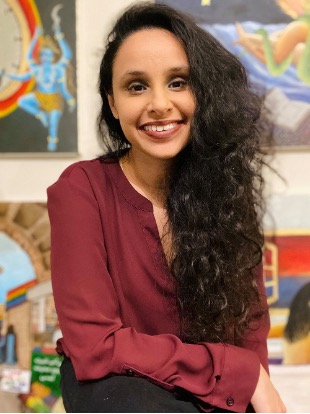 Dr. Nisha Gupta is a liberation psychologist, art activist, and phenomenological researcher who disseminates research findings about people’s lived experiences of oppression and empowerment through artistic formats for social advocacy and community healing. Her projects include: “ILLUMINATE” a phenomenological short film about the lived experience of being in the LGBTQ closet, for which she received the 2020 Annual APA Division 5 Distinguished Dissertation Award in Qualitative Methods; and “DESI EROS,” a series of surrealist folk art paintings about the lived experience of reclaiming erotic power among women from the South Asian Diaspora, which was featured on the NPR-affiliated podcast and radio program “The Academic Minute.” At the University of West Georgia, where she teaches as an assistant professor of psychology, she founded the PHENOMENOLOGICAL ART COLLECTIVE, a research & creative arts lab through which she teaches students to disseminate phenomenological research to the public through the expressive arts. She also hosts workshops as a consultant in partnership with community organizations, through which she teaches arts-based phenomenology to community members and the public as a therapeutic method.
Dr. Nisha Gupta is a liberation psychologist, art activist, and phenomenological researcher who disseminates research findings about people’s lived experiences of oppression and empowerment through artistic formats for social advocacy and community healing. Her projects include: “ILLUMINATE” a phenomenological short film about the lived experience of being in the LGBTQ closet, for which she received the 2020 Annual APA Division 5 Distinguished Dissertation Award in Qualitative Methods; and “DESI EROS,” a series of surrealist folk art paintings about the lived experience of reclaiming erotic power among women from the South Asian Diaspora, which was featured on the NPR-affiliated podcast and radio program “The Academic Minute.” At the University of West Georgia, where she teaches as an assistant professor of psychology, she founded the PHENOMENOLOGICAL ART COLLECTIVE, a research & creative arts lab through which she teaches students to disseminate phenomenological research to the public through the expressive arts. She also hosts workshops as a consultant in partnership with community organizations, through which she teaches arts-based phenomenology to community members and the public as a therapeutic method.
You can follow her artistic pursuits via social media at www.nishagupta.org, on instagram @artsbynisha, and on Facebook’s Phenomenological Art Collective group
SAMPLE ARTWORK
ART EXHIBITIONS
BIPOC & DESI Queer Art Exchange 2.0. (February 2021). “DESI EROS”.
LACPA’s Virtual Art Exhibition: Mirrors of the Mind: The Psychotherapist as Artist in a Time of Coronavirus. (November 2020.) “She.”
Black Iris Gallery (November 2019). Group exhibition on Eco Martyr Portraits: Faces of the Slain, curated by Richard Bargdill, Ph.D. Richmond, VA. “Archad Ayao.”
Muses & Vices Magazine (October 2019). Special edition issue on Erotic Joy. “The Moment of Surrender.”
Colorado International Film Festival (July 2018). Film screening and award winner of best special effects, most artistic, and best soundtrack in the documentary genre. “Illuminate.”
SELECTED ACADEMIC PUBLICATIONS
Gupta, N. (2020). Teaching phenomenological research as a method of therapeutic art-making: A Covid-19 case study. Qualitative Methods in Psychology Bulletin: Special issue on creative and multimodal approaches to Qualitative Research, Issue 30 Autumn 2020.
Gupta, N. (2020). Illuminating the trauma of the LGBTQ closet: A cinematic-phenomenological study and film about existential rights. Qualitative Research in Psychology.
Gupta, N. (2020). Singing away the social distancing blues: Art therapy in a time of coronavirus. The Journal of Humanistic Psychology; Special issue on COVID-19. Onlinefirst.
Gupta, N, Simms, E., and Dougherty, A. (2019). Eyes on the street: Photovoice, liberation psychotherapy, and the emotional landscapes of urban children. Emotion, Space, and Society, 33.
Gupta, N. (2019). The phenomenological film collective: Introducing a cinematic-phenomenological research method for social advocacy filmmaking. Social and Personality Psychology Compass, 13(4)
Gupta, N. (2018). Stories of faith, stories of humanity: Fusing phenomenological research with digital storytelling to facilitate interfaith empathy. Qualitative Research in Psychology. DOI: 10.1080/14780887.2018.1442705
MEDIA INTERVIEWS
United Against Silence podcast. (2021). Interviewed about depth psychology and phenomenological approaches to the creative process, and their connection to spirituality, healing and love.
The Academic Minute (2020): Interviewed about using arts-based research as a vehicle for social advocacy and community trauma healing.
We Are Moving Stories (2018): Interviewed about the development of phenomenological short film “illuminate,” a cinematic poem about being in the closet as sexual minorities.